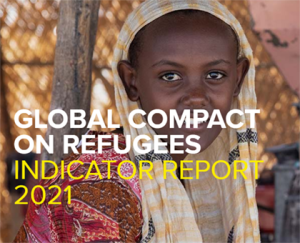Mixed report card on Global Compact on Refugees
Progress has been made in implementing the new Global Compact on Refugees which seeks to share responsibility for refugee situation but there is more work to be done.
That’s the verdict of the first Global Compact on Refugees (GCR) Indicator Report that covers the years 2016 to 2021.
 The report says that progress has been made in increasing support for low-income countries hosting refugees and in expanding refugees’ access to work and education.
The report says that progress has been made in increasing support for low-income countries hosting refugees and in expanding refugees’ access to work and education.
“The picture that has emerged is mixed. We see that countries with the fewest resources continue to bear the most responsibility for both new and protracted refugee situations,’ the report says.
“At the same time, we are seeing some good indications of progress by states, the private sector, civil society, and development banks in helping to try and bridge the gap,” said Professor Gillian Triggs, the UNHCR’s Assistant High Commissioner for Protection and Australia’s former Human Rights Commissioner.
The report shows that while more financing for refugee humanitarian and development responses is needed, there has been an upward trend in bilateral development assistance channelled to low-income refugee host countries since 2016.
Development banks are also playing a larger role in responding to crises providing at least US$2.33 billion, the report says. The number of refugee situations supported by the World Bank for example increased from two to 19.
The report also estimates that three-quarters of refugees can legally work in their host countries, although less is known about how this translates into practice.
This is especially critical given that an estimated two-thirds of refugees face poverty, and their plight has only compounded as a result of the pandemic.
Some improvements have also been seen in the inclusion of refugees in national education systems.
Refugee children, technically, have access to primary education on the same terms as nationals in three-quarters of refugee-hosting countries, and secondary education in two-thirds of countries.
But many barriers still exist with almost half of all refugee students out of school, the report says.
It also says that while more refugees accessed solutions from 2016 to 2021 than in the previous five years, ongoing conflicts prevent most refugees from returning home.
Only one per cent returned in 2020 compared to three per cent in 2016. And the pre-existing gap between resettlement needs and places had also widened.
“With around nine out of 10 refugees hosted in developing regions and the impact of the COVID-19 pandemic felt acutely in these countries, responsibility sharing – which is at the core of the Compact – must be stepped up to meet the challenges we are facing – both now and in the years to come,” Prof Triggs said.
The Global Compact on Refugees Indicator Report measures progress made by the international community against the Compact’s key objectives.
While the report reveals major data gaps and limitations, the evidence base it provides is a starting point.
It is aimed at identifying where to focus into the future, especially as the international community develops new contributions for the next Global Refugee Forum in 2023.
Read the full report here: https://www.unhcr.org/global-compact-refugees-indicator-report/












